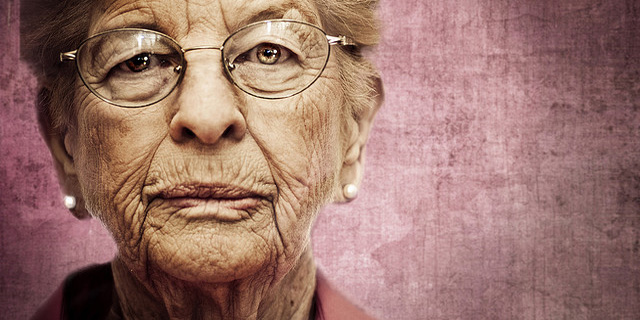Aging means many things to many people and has a different association with each stage of life. When we’re children, aging means rapid physical development and learning basic life skills, while becoming an adult means addressing self-sufficiency and taking on more responsibilities, including career decisions, family and finances. But no matter what stage of life we’re in, as our thoughts, dreams and emotions are constantly in flux and evolving, so too are our bodies.
Genetics play a major role in when, how and at what rate we age–both mentally and physically–but there are a number of other factors contributing to those lines on your face and that cellulite you just can’t shake. Diet grossly affects the aging process, as can exercise–or a lack thereof–and mental stimulation. Our environment and stress level also play huge roles in our overall health and well-being, as do hormones. Ultimately, the actions we take, or fail to take, as we grow older have an impact on our overall quality and length of life.
Physical signs of aging are plenty and can include wrinkles, sagging skin and decreased muscle mass, as well as decreased bone density, an increase in body weight, memory loss, decreased brain function and an increasing risk for illness. In other words, a lot happens, and it happens more rapidly and drastically the older we get. While aging is something we cannot avoid, it has certainly become something we collectively spend millions of dollars a year to delay. And the best way to delay aging, like anything else, is by understanding the process and identifying areas where we can be proactive.
In need of some professional insight regarding exactly how proactive we can and should be when it comes to delaying superficial physical signs of aging, I reached out to Dr. Jeffrey Spiegel, Chief of Facial Plastic and Reconstructive Surgery at the Boston University School of Medicine, where he’s also a professor. Dr. Spiegel touched on the few more prominent signs of aging he sees in patients who visit his practice–wrinkles, skin volume and clarity–as well as treatment and prevention.
Protect your skin
While bronzed can often mean beautiful, “the real attraction lies not so much in darker skin but in that even skin tone, which can be achieved first and foremost by protecting those pores,” Dr. Spiegel explained. “Sunscreen not only prevents unsightly spots, but it prevents wrinkles too.”
Moisturizing is critical in restoring skin volume and that healthy glow, and even though our skin can heal itself–and various products can expedite that process–the more time we spend in the sun, the less opportunity we are giving it to do so. The take-away: Wear a broad-spectrum sunscreen with an SPF of at least 30, and wear it every day. If you’re at the beach, cover up, wear a hat and set up an umbrella. We cannot avoid the sun altogether, nor should we, as it plays an important role in our bodies development of vitamin D, but we should enjoy it in moderation and take further steps to protect our skin when doing so.
In addition to sunscreen, there are many over-the-counter and prescription creams and treatments that can help restore and rejuvenate skin and minimize wrinkles, spots and sagging. Most contain retinoids, which are vitamin A derivatives that unclog pores, boost collagen and increase cell turnover to even out discoloration and promote smoother skin.
Not afraid of needles? A small dose of Botox, even at 30, can be a preventative step towards keeping lines and wrinkles from forming and will smooth any already existing lines out. Do your research, though, and make sure you choose a reputable doctor. According to Dr. Spiegel, those tight, expressionless faces we associate with Botox are often because of the practitioner, not the product. Another interesting fact: Botox has been known to help prevent and minimize migraine headaches. Check out this 2011New Scientist article for an interesting overview.
As with anything, before you go out and spend loads of money on creams and treatments, get an opinion. Your doctor, dermatologist or surgeon has access to a plethora of knowledge and can best advise which might be the best approach for you to take.
Improve your diet
Dietary choices are critical when it comes to aging and age-related illness and disease, as well as overall quality of health, immunity and life in general. Whether you’ve spotted a wrinkle or not, below is a list of 12 healthy foods to incorporate into everyday eating, sourced from award-winning food writer and chef Dana Jacobi’s “12 Best Foods Cookbook.” When preparing meals, from breakfast through that midnight snack, be sure to keep these at hand:
- Black beans
- Blueberries
- Broccoli
- Chocolate
- Oats
- Onions
- Salmon
- Soy
- Spinach
- Sweet potatoes
- Tomatoes
- Walnuts
Shake that ass
As we age, our bones decrease in both size and density, making them weaker and more likely to fracture. Muscles, too, decrease in size, strength and flexibility, and are harder to build back up and stretch back out without regular training. Too often we make excuses for missing that morning workout or that afternoon yoga class; if schedules just won’t permit such planning, then create ways to get in a similar workout in increments throughout the day. Establishing a new workout routine, or revamping your current training methods, does not necessarily mean spending tons of money on a gym membership or hours with a personal trainer, either. It can be as simple as walking or biking to work instead of taking the train or driving, and taking the stairs instead of the elevator or escalator.
In addition to bone and muscle mass, exercise supports healthy skin as well. Sweating purges your body of toxins and clears pores of build-up; it delivers more oxygen and nutrients to your skin through increased blood flow and promotes the production of natural oils that make your skin healthy and supple. Not too shabby for something that not only makes you feel better, but look better, too.
Drink water
Water makes up approximately 60 percent of our overall body weight and 90 percent of our brains. It protects tissues and joints, aids in digestion and helps remove waste, and it promotes healthy brain functioning. Not enough can be said about the importance of daily water consumption–tap, bottled or straight from the stream, make sure you drink, drink, drink!







